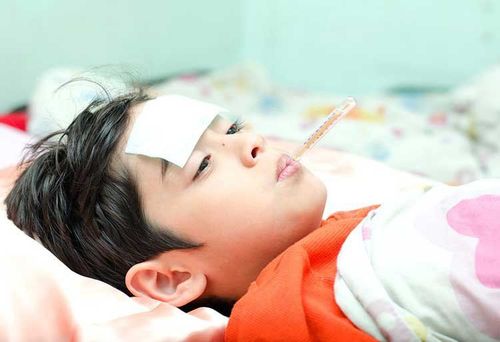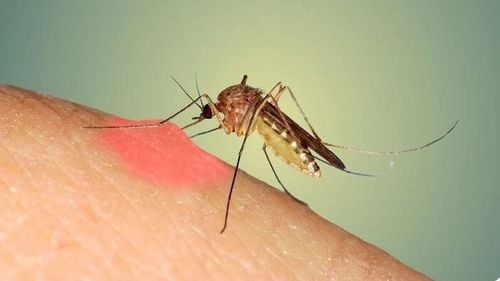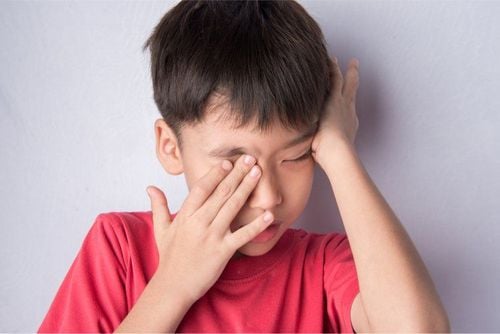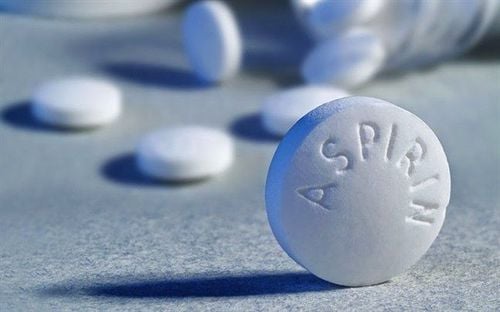This is an automatically translated article.
The article was professionally consulted with Doctor of Pediatrics - Neonatology - Vinmec Nha Trang International General Hospital.Reye's syndrome in infants and children is an acute brain injury, fatty liver disease mostly after acute viral infection. Although the cause of the disease is not clear, there are some signs such as fever, rash, diarrhea... that help in the diagnosis. Early treatment helps children improve their health status and recover early.
1. What is Reye's syndrome?
Reye's syndrome is a rare and very serious illness that can be experienced in children while they are recovering from a viral infection such as the flu, a cold or chickenpox.Reye's syndrome can cause:
Brain edema Accumulation of large amounts of fat in the liver and other organs Liver failure, brain damage and even death if left untreated Reye's syndrome commonly affects children children between the ages of 4 and 12. However, it can also occur in infants, toddlers and adults. While it can happen at any time of the year, rates are highest during flu season months like January, February, and March. Reye is often misdiagnosed. For example, it can be confused with encephalitis, meningitis, a drug overdose, sudden infant death syndrome (SIDS), or poisoning.
If you think your child may have Reye's syndrome, treat it as a medical emergency. You need to call the doctor immediately, take the child to the emergency room for examination and treatment. Early diagnosis of reye's syndrome in infants, toddlers, and adults can lead to tailored treatment options as well as significant improvements that increase a person's chances of survival.
2. What causes Reye's syndrome in children?
The exact cause of Reye's syndrome is unknown, but it seems to occur after a viral infection and is closely related to aspirin and aspirin-containing medications. In fact, 90 to 95 percent of patients with Reye's syndrome in the United States took aspirin during a recent episode of viral illness.To protect and prevent children from getting Reye's syndrome, never give aspirin or products containing aspirin to infants or young children for any reason unless advised otherwise by a doctor. Note that aspirin is sometimes also known by other names such as salicylate, acetylsalicylate, acetylsalicylic acid, salicylamide, and phenyl salicylate. Two popular over-the-counter products that contain aspirin are Alka Seltzer and Pepto Bismol.
Some children are prescribed aspirin for a particularly necessary medical condition, such as heart or brain disease. In this case, your doctor has considered that the benefits of aspirin therapy for your child may outweigh the risk of Reye's syndrome.

Trẻ mắc hội chứng Reye không được sử dụng aspirin
3. Prevalence of Reye's Syndrome in Children
Reye's syndrome is extremely rare. The number of cases of Reye's syndrome peaked between 1979 and 1980, at 555. After that point when the government started issuing warnings about the association between Reye and aspirin, the number of cases of Reye's syndrome dwindled. Since 1994, two or fewer cases have been reported annually in the United States.4. Signs and symptoms of Reye's syndrome in infants and children
The symptoms of Reye's syndrome come on very suddenly. In fact, early symptoms often include:Fever (this is often the first symptom) Diarrhea Lethargy Drowsiness Rash In infants, the first signs may include diarrhea and irregular breathing . Symptoms usually appear when a child is beginning to recover from a viral illness, but they can appear as early as three days after the onset of the illness or as late as three weeks after the illness is gone.
As the disease progresses and affects the brain, the child may show the following signs:
Agitation Hyperactivity Confusion Restlessness Abnormal posture (arms and legs extended, toes pointing down, head and neck bent) back) Convulsions Falling into a coma If Reye's syndrome symptoms are left untreated, a child with Reye's syndrome can die.
Of course, children with other, less serious illnesses can also have some of these symptoms. But because early treatment of Reye's syndrome is so important, parents of children need regular monitoring and should be on the lookout for suspicious signs of the disease.
5. Diagnosis of Reye's Syndrome in Infants and Children
To diagnose Reye's syndrome, the doctor or healthcare provider may ask the child's parents about the child's recent symptoms, as well as questions about the child's health history. any recent viral illness and if the child has been taking aspirin or aspirin-containing medicines it should be informed so that the doctor can make an accurate diagnosis to help the treatment work effectively and improve the child's health status.In cases where the child is suspected of having Reye's Syndrome, the doctor or medical staff may order tests to be performed for the purpose of getting accurate results to help the diagnosis process be highly effective. Those tests include:
Blood tests Urine and stool tests Liver biopsy (where a small sample of your child's liver is taken for testing) Electroencephalogram (EEG) (to check brain activity) Cerebrospinal fluid (This test involves taking a sample of CSF from your child's lumbar spine so it can be tested for a brain or meningeal infection) Intracranial pressure (ICP) monitoring ( to measure the pressure inside your child's skull in case of cerebral edema) MRI (head)

Bác sĩ có thể chỉ định xét nghiệm máu nếu nghi ngờ trẻ mắc hội chứng Reye
6. Treatment of Reye's syndrome in infants and children
Children with Reye's syndrome need to be treated in the hospital. Prompt diagnosis and early treatment are the keys to a highly effective treatment of this disease. There is no specific treatment for Reye's syndrome, but children can recover with early supportive treatment. Prognosis depends on the duration of brain dysfunction, the degree of increased intracranial pressure, and the severity and progression of brain symptoms.At the hospital, the doctors will provide supportive treatment including:
Make sure the child stays hydrated. Monitor blood pressure and intracranial pressure. Mechanical ventilation for children with respiratory failure. Give some medicine depending on the symptoms: eg diuretics, anticonvulsants for seizures and corticosteroids to reduce brain edema...
7. How to protect children from Reye .'s syndrome
Not giving aspirin to a child unless prescribed by a doctor is the best protection for the child.Reye's syndrome is not contagious, so you don't need to worry about whether your child is susceptible to this syndrome if he or she is healthy and doesn't self-medicate.
To protect your baby's health, take the following precautions:
Do not give aspirin to your child. Never give aspirin to anyone 19 years of age or younger. If your child has a viral infection (or even has viral-like symptoms), ask the doctor if you can give him a safe pain reliever if needed. Also note that so-called "baby aspirin" is not intended for infants, so it is not recommended for use by young children. It's a low-dose aspirin that is sometimes taken by older adults to help prevent heart attacks and strokes. Do not take aspirin if you are breastfeeding. That includes products that contain aspirin. The drug will pass through breast milk. Read labels carefully to avoid accidentally giving aspirin to children. Many over-the-counter medicines contain aspirin, including some antacids, anti-nausea, colds, and sinus medications. Look out for terms such as salicylate, acetylsalicylate, acetylsalicylic acid, salicylamide, and phenyl salicylate, which may be used in place of aspirin. Many over-the-counter medications are not safe for young children. So check the age restrictions and ask your doctor if you have any questions about the appropriateness of the medicine for your child. The pediatric department at Vinmec International General Hospital is the address for receiving and examining diseases that infants and young children are susceptible to: viral fever, bacterial fever, otitis media, pneumonia in children With modern equipment, clean and airy space, minimizing the impact as well as the risk of disease spread. Along with that is the dedication from the doctors with professional experience with pediatric patients, making the examination no longer a concern of the parents.
If you have a need for consultation and examination at Vinmec Hospitals under the nationwide health system, please book an appointment on the website for service.
Please dial HOTLINE for more information or register for an appointment HERE. Download MyVinmec app to make appointments faster and to manage your bookings easily.
Reference source: babycenter.com












